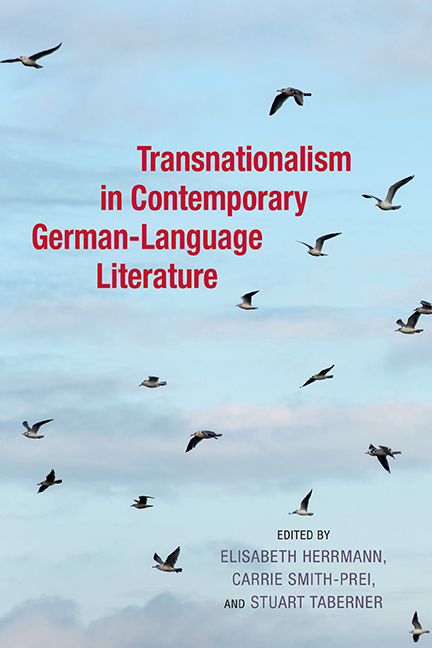Introduction: Contemporary German-Language Literature and Transnationalism
Published online by Cambridge University Press: 10 June 2021
Summary
TRANSNATIONALISM IS “not new and has been around since ancient times,” Michael Howard reminds us. Yet in the contemporary era the “ties, interactions, exchange and mobility” that connect across and between nations, Steven Vertovec argues, “function intensively and in real time while being spread throughout the world.” Economic globalization, instantaneous electronic media, and the movement of millions around the globe today appear to be rendering national borders—and the cultures, polities, and frameworks of understanding that they are imagined to contain—more porous than ever before.
Transnationalism—understood in this volume as a plurality of intersecting, and crosscutting flows of products, ideas, and people back and forth over borders—presents a number of challenges to scholars working in the humanities and social sciences. How are they to conceptualize transnationalism beyond the conventional focus on the experience of those “minority” individuals or groups who span two or more cultures as migrants, refugees, or exiles? That is, how can they move beyond a focus on diasporic formations, hybridity, or notions of center and periphery in order to theorize how contemporary transnationalism's characteristic multidirectionality and saturation of all aspects of everyday life, from consumption to culture, impacts everyone, whether “settled” residents of a given national space or transient “guests”? How can they best conceptualize the nation's continued salience—the persistence of the nation in transnationalism—for its citizens, and for those it refuses to accept as such? And how are they to rethink the nation's continued centrality to persistent global imbalances in economic, geopolitical, and military power, even as transnationalism appears to weaken that nation's claim to be sovereign?
For literary scholars, specifically, the reality of contemporary transnationalism prompts us to think more closely about the ways fiction written in a particular time and in a particular place—in the context of this volume, in the German-speaking countries—connects to, circulates through, and is rechanneled by global patternings and global debates on identity, mobility, hospitality, universalism, self-forming, and cosmopolitanism.
- Type
- Chapter
- Information
- Publisher: Boydell & BrewerPrint publication year: 2015
- 2
- Cited by

